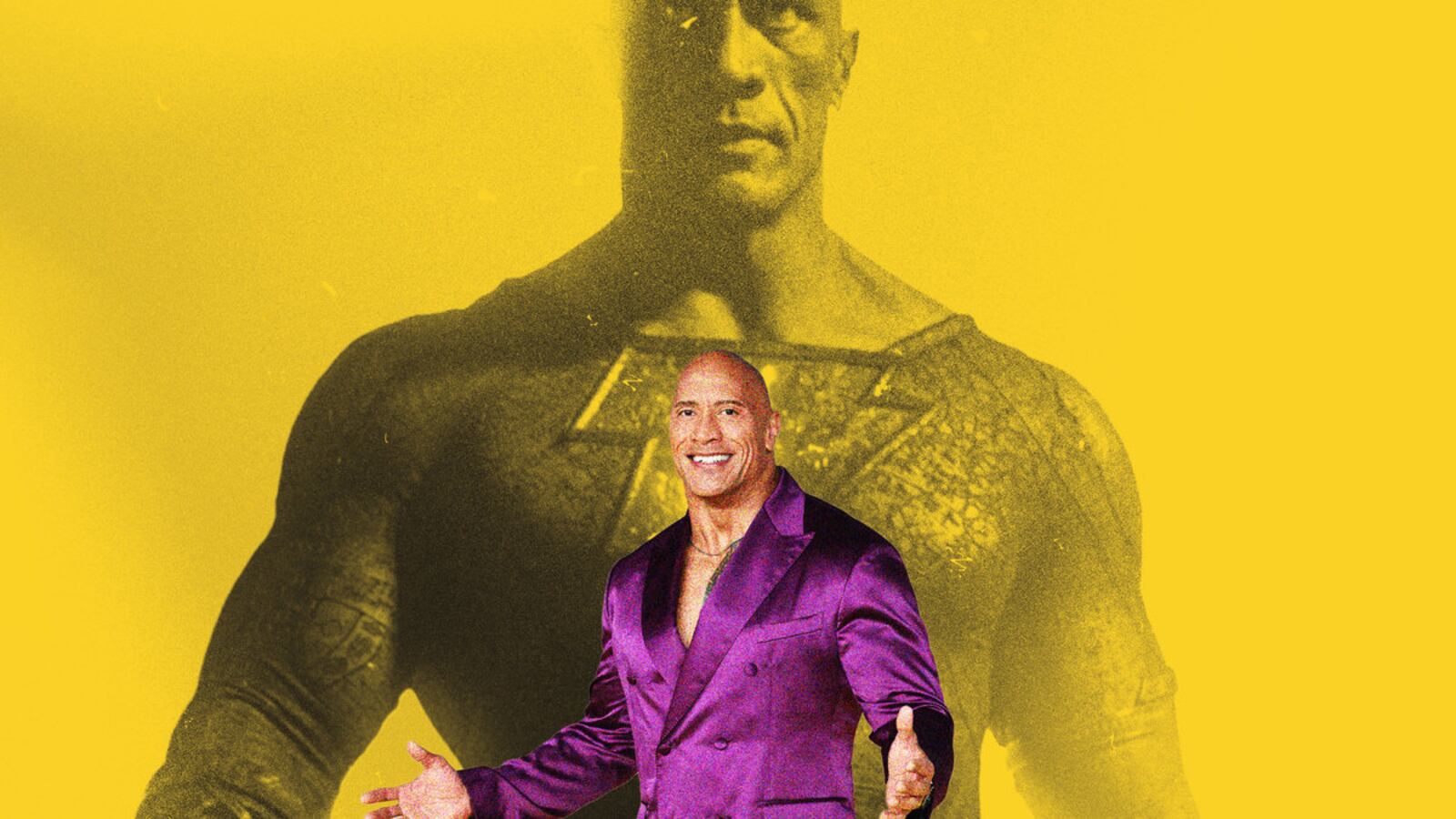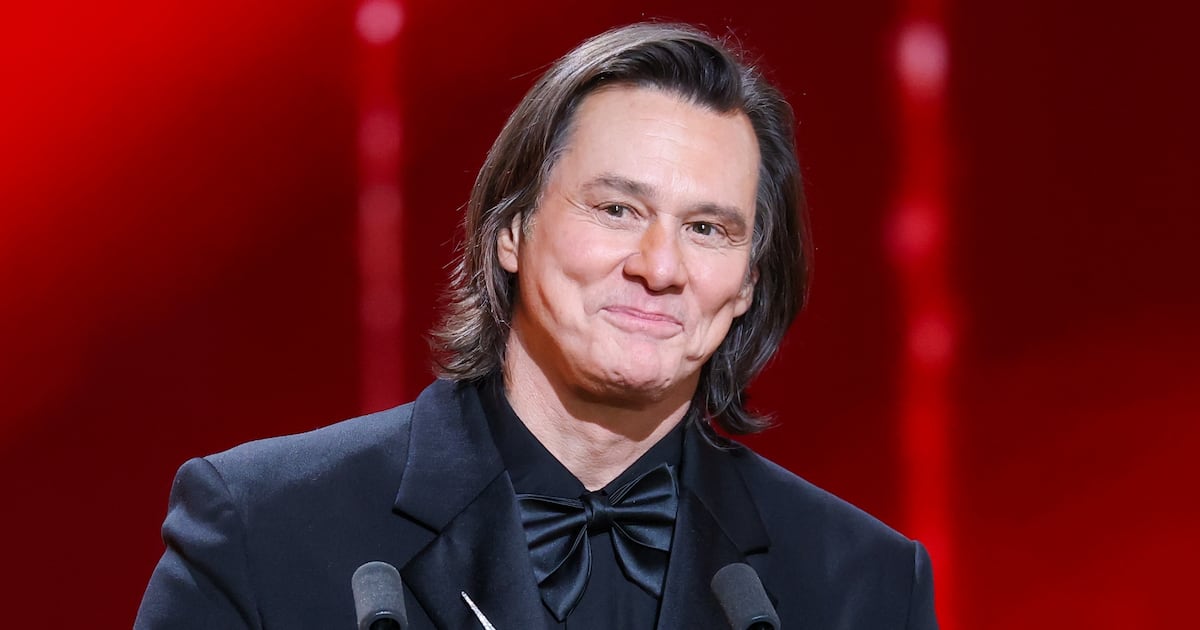I am a big fan of Black Adam, the DC comic book character with magical, Superman-like powers. I am also a big fan of “The Rock,” now known mostly by his real name, Dwayne Johnson. But I am apprehensive about the upcoming Black Adam movie, out Friday. I’ve long feared that it was going to be terrible—and early reviews already confirm those suspicions.
“But doesn’t everyone love The Rock?” you may ask. Sure. But he’s also an incredibly bad fit for this particular character, no matter how much he may love Black Adam or look like him. The Rock, unlike Black Adam and every other superhero character imaginable, will never allow himself to lose.
The Rock has made a career out of this. He reportedly enlists a whole team to make sure he doesn't get hit too many times on screen or be depicted in any way that even remotely hints that his fictional character is not invincible. Like many other tough-guy action stars, he insists on his on-screen infallibility. Because of the star power he has, The Rock gets his way.
Think back to the Fast & Furious franchise, the one involving absurd plots using good driving skills to save the world. Does anything feel odd in a way that you can’t place? Perhaps it is that none of the big-name action stars in the cast ever lose any fights. A widely cited Wall Street Journal piece)" href="https://urldefense.com/v3/__https://www.wsj.com/articles/fast-furious-stars-complicated-demandi-never-want-to-lose-a-fight-11564673490__;!!LsXw!SmRt5FhOrIAemke5fAUAa7n9g14RLarpi8P20wM31lktW7oBfuYB_5G4sJ_Ia4koIZseoKFHysQHUGESKjbNsjlHlFaV$">Wall Street Journal piece from 2019 even did the math to reveal that, if Vin Diesel’s Dominic Toretto throws The Rock’s Agent Luke Hobbs through a wall in Fast Five, then The Rock needs to throw Diesel through a wall as well. (No wonder the guys don’t like each other.)
Any fight that anyone does not outright win has to be resolved with some deus ex machina that still shows The Rock as tough and cool. Suddenly, there will be an explosion, and then Hobbs has to jump out of a window to save someone else's life.
Of course, when cars can be parachuted from the sky, all logic must be abandoned and all bars must be lowered. Nobody expects high art from Fast & Furious. That same can be said for comic book movies—or any other genre. But it doesn’t have to be that way.
As seen by the success of March’s The Batman, starring a very emotional Robert Pattinson, good comic book stories are defined by what The Rock refuses to show on screen: vulnerability. Superman’s invulnerability has long been cited as one of the major writing challenges by comic book writers. If you can do anything and not be hurt by anyone, what hurdles do you have to overcome, how might your mettle be tested? It’s why the quality of Superman story arcs in the comics varies drastically from writer to writer. Superman movies have also never been as well-received as Batman ones for the same reason—the Dark Knight, unlike the Man of Steel, is only a man, with all our mortal weaknesses.
Which brings us to Black Adam. There definitely have been cases in which Black Adam is all tough guy, knocking out everyone in his path. But Black Adam has also suffered losses when the story called for it. He’s mighty, but not all-mighty.

Dwayne Johnson as Black Adam.
Courtesy of Warner Bros.After all, Black Adam had begun as a villain. First appearing in 1945, he’s an Ancient Egyptian counterpart to the hero Captain Marvel (now known as Shazam on the big screen, played by Zachary Levi, to avoid confusion with the similarly named Marvel character). Like Captain Marvel, Black Adam was imbued with the power of the gods. But unlike his nemesis, Adam took the fighting part of "crime fighting" too far and got punished by the gods for it. Locked away for centuries, he awoke in the present day and set about challenging Captain Marvel.
It was only later in the comics that Black Adam became what is called an “anti-villain.” Like how an antihero is a hero with villainous qualities, an anti-villain is a villain with heroic qualities. Black Adam still has many disagreements with the modern-day heroes, but stories often have them fighting on the same side.
What I’ve liked about the comic book character is that, despite his Superman-like powers, Black Adam has failed to prevent the countless tragedies that have marked his life. In a story arc from 2000, Black Adam’s lover, Isis, dies after from a disease brought by his enemies. A humanoid crocodile then bites the legs off Isis’s brother, who’s almost like an adopted son to Adam. Worse, Adam’s country is ravaged by enemies calling themselves the Four Horsemen of the Apocalypse.
At that point, Black Adam snaps. He goes on a hate-filled rampage for vengeance, and the world’s superheroes have to rein him in. He ends up losing his powers, only evading escape when his henchmen change his appearance. In dire circumstances, he ends up cannibalizing one of his men as a means of survival.
As Black Adam tries to bring Isis back to life, he finds a way to temporarily regain his powers—but every time he uses that power, he drains away some of the magic from her bones. Eventually, when a fully powered-up Black Adam tries to revive Isis, he finds that he had used too much of the magic from Isis’s bones; she can’t survive. In a way, it was Adam's own quest for power—both literal and figurative—that killed the love of his life. (There’s another twist coming afterward, but that’s another story.)
Black Adam is constantly tortured and pained like this, haunted by the recent and centuries-long past alike. His suffering gives him unique shades of gray among the DC Comics cast—something I’m not convinced the Rock will bring to the character.
It’s clear that The Rock does, at least, know and love the character. Black Adam, as has been widely reported, is The Rock’s baby. Using his Hollywood star power, he was able to exercise massive amounts of creative control over the project. Black Adam was initially supposed to appear in the first Shazam movie, in fact—but The Rock kept him out, wanting the character’s debut to be in his own starring feature.
The Rock was able to do that because of the obvious: He would make a perfect Black Adam, if we judge just by physique and demeanor. That is undeniable. But because there is nobody that more resembles Black Adam than The Rock, the man holds power over the studio. Warner Bros. is at his mercy, especially since it could badly use a win where its canonical DC movies are concerned.
That is fine if The Rock is not also playing the the main character—and if he does not appear to be so immaturely vain by wanting to always look cool even when it’s obvious everything is staged in a movie. How can we expect a good movie if the main character is not allowed to show any vulnerability? In journalistic terms, we'd call this a conflict of interest — and the result, in industry speak, is potentially not an editorial product that stands on its own but a public relations exercise for the Rock.
If The Rock wants to be known as a serious actor, he should know that Jackie Chan, despite the commercial success of his martial arts films, only truly shined as an artist after he got older and started acting in non-action roles. The Rock should also know that what makes John Wick compelling is not just how Keanu Reeves can defeat 25 people at once. It's also in how the character grieves for his dead wife and what is symbolized by his sacrifice when (spoiler alert) he chops off his own ring finger.
Black Adam is also a character-driven film, and one that needs to set the stage for the next step in a giant, expensive franchise. Despite the obvious box office success of The Rock’s films, each has been more forgettable than the last. The Rock has basically played the same character each time: himself. And that’s not who the actual star of Black Adam is supposed to be.
I have not seen Black Adam yet, so I shall not judge prematurely. But going by The Rock’s track record of creative interference, I fear that in Black Adam we will have just another Agent Luke Hobbs, but flying.






